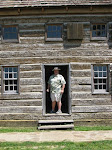On June 15, 1215, the opposition demanded certain liberties from the English crown throughout the kingdom. King John had no alternative but to sign the document, the Magna Carta, if he wished to remain on the throne. The document had several demands but three of them were most significant. They were: the Church had authority to select its staff, money beyond set payments were to be collect by the King from his tenants without their approval, and all punishment of freeman was to be carried out according to the law of the land.
 |
| Articles of the Barons (Magna Carta), 1215 British Library |
Here is a summation of the significance of the document for English people written by Michael Wood in his book, The Story of England, a companion volume to the BBC documentary of the same name:
In the Magna Carta in 1215 King John had acceded to the barons' demands made in response to his wholesale abuses of power. In essence it was a charter for the ruling class but it embodied the crucial principle that the king was bound by the law. Immediately after John's death Magna Carta was reissued in the name of his successor, and there were several versions up to 1225. Since then it has come to be regarded by English people, and by all who have adopted English law, as the chief constitutional defense against arbitrary or unjust rule. Its most famous clauses express some of the English people's most deeply held political beliefs, and pertain to both rich and poor:
No free man shall be seized or imprisoned, or stripped of his rights or possessions, or outlawed, or exiled, or deprived of his standing in any other way, nor will we proceed with force against him, or send others to do so, except by the lawful judgement of his equals, or by the law of the land . . . To no one will we sell, to no one deny or delay right or justice.
Later lawyers found here the basis for fundamental English rights: equality before the law and freedom from arbitrary arrest . . . .
Stephen Hayward provides more information in this fine Instapundit tribute to today's historic moment in Western history.
Sources
Text:
Kings and Queens of England and Great Britain, Eric R. Delderfield, David & Charles Publishers, Devon, 1977

No comments:
Post a Comment